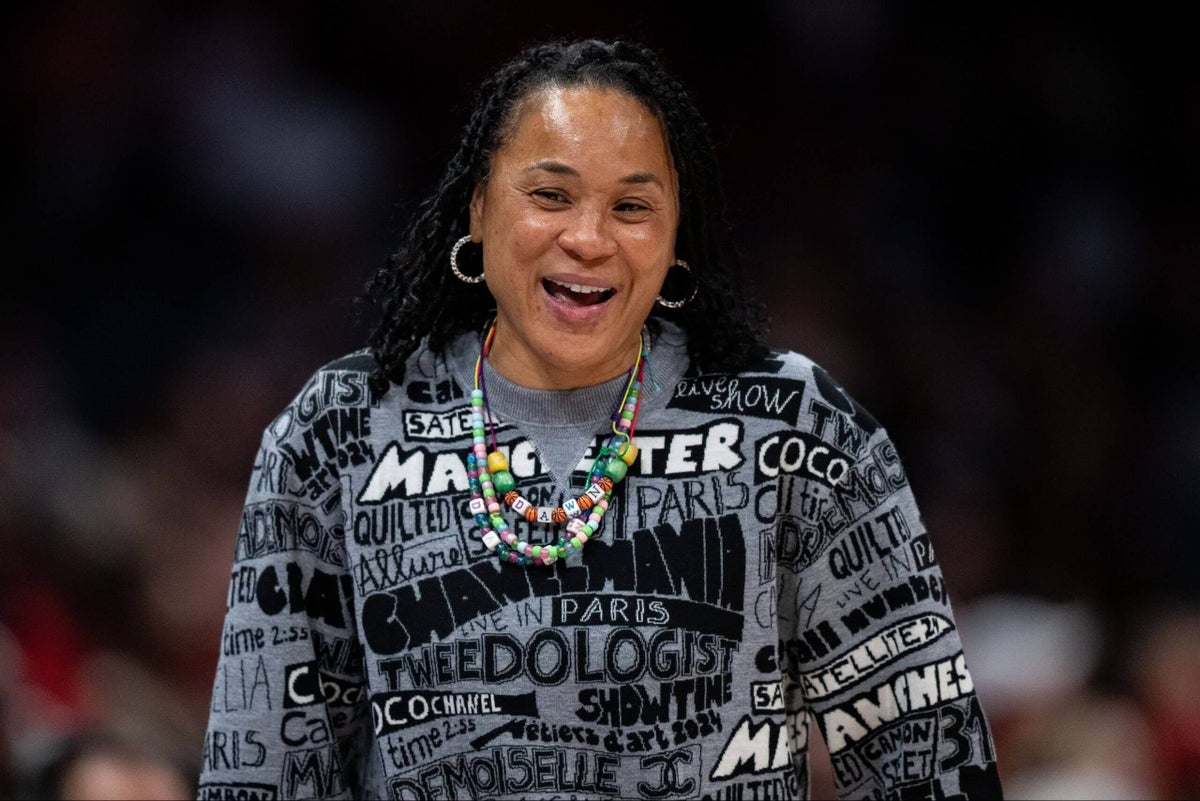COLUMBIA, S.C. — Just a few weeks before South Carolina began its campaign to defend its national title, fifth-year senior Te-Hina Paopao laughed and joked with teammates on the sideline during practice as coach Dawn Staley stood nearby and rattled off feedback to players conducting a full-court drill.
Staley either didn’t notice or didn’t mind Paopao that October Monday (but given that it’s Staley, it’s fair to assume it’s not the former). A year ago, Staley would’ve characterized it as Paopao’s being unfocused. The constant chatter would have felt like disrespect to the game and that she was allowing distractions to enter this sacred space. But today, Staley doesn’t see it that way at all. Instead, she understands it as a necessary piece of what this team needs and more importantly, how she needed to adjust for her players. It’s now part of how they win games, even if it wasn’t how she won games in the past.
That ability to adapt might be Staley’s greatest asset as the No. 1 Gamecocks, who are on a 40-game winning streak, return most of last season’s roster and embark on a season in which they could become the first program to repeat as national champions since UConn won four straight from 2013 to 2016.
Dawn Staley after @GamecockWBB’s win over NC State:
“That’s why we put the schedule together the way that we did b/c we wanna challenge ourselves. It may end up in a loss somewhere down the line or two, but we’re working towards playing in March & April in November & December.” pic.twitter.com/javEiTvTun
— Matt Dowell (@MattDowellTV) November 10, 2024
Staley has set the bar high at South Carolina. Time and time again, she has asked players to step outside their comfort zones. But last year, she had to do that too … even if she fought it first. A year ago at this time, when her players wouldn’t stop chattering, she’d looked to the north end of the gym where massive banners hang representing South Carolina’s first-round WNBA Draft picks. She’d remember what it had been like to coach those players who helped Staley mold the program into the gold standard and she’d fear, is this team going to tear down everything we built?
But then? That team accomplished something none of those players on the wall ever did — went undefeated and won a national title. In the course of that run, last season’s team also taught the Hall of Fame coach an unexpected lesson: Even in her mid-50s, after she’s won almost everything, there is still a lot more to learn.
“This game will stretch you out. It will give you what you need,” Staley says. “In some uncanny way, I’ve always gotten something I needed at the time I needed it.”
When she was a player, successes and losses often reinforced Staley’s idea of what it meant to respect the game — to be focused, to remove distractions. When she was cut from the 1992 Olympic team, the crushing defeat fueled her drive to return in 1996 (and an additional two Olympics after that). When she started as a coach at Temple in 2000, she was still playing in the WNBA, and the game allowed her to learn how to balance herself and see the game differently.
When South Carolina — then an SEC bottom dweller — hired Staley in 2008, she came in with an intensity and expectation that the players would have the same drive and chips on their shoulders as she did. But they didn’t. During Staley’s first preseason in Columbia, associate head coach Lisa Boyer pulled Staley aside to tell her that all the players could hear was her volume, not her words.
If Staley wanted to get through to them, she needed to pivot. She didn’t need to lower her standards, but she needed to change her approach.
The game gave her a chance to evolve. And she did. South Carolina, which had been to the Sweet 16 just twice in its history, won its first national title nine seasons after Staley took over.
Last season, Boyer reminded her of that pivot 15 years earlier and made her consider that the game perhaps was giving her a chance to do it again, to stretch herself as a coach. This time, it wasn’t about changing how she communicated but allowing players to communicate the way they needed to, to cede ground in a way she never had before to get this group to go further than she ever had before. Staley, who describes herself as an old-school coach who likes things to be defined strictly as right or wrong, suddenly realized she needed to step into the gray area so South Carolina could reach its full potential.
“She changed her coaching,” Paopao says. “She had to get things across quickly before we started losing attention. We were good for like six to eight minutes … . And she knows that. She knows our attention span is small.”
Staley picked her battles. She allowed the talking, singing and joking so long as players were more disciplined in every other way on and off the court. When they were late to team events or missed classes, she enforced time off from basketball. They weren’t allowed in the gym or weight room. Staley called it PTO.
Amid the players’ constant noise, Staley saw something clearly — this team was becoming one of the closest she had ever had. What she had once seen as a distraction she wanted to eliminate was unexpectedly what brought players together.
“I enjoy the challenges of the job, I really do. And I think I’m pretty good at it. But some stuff, you can’t win,” Staley says, referring to her losing the battle against her players in their chatty silliness.
The hallmark of great coaches is their ability to adapt over the years. Often, the focus is on an evolution on the court or how they adjust to new rules, not how a coach fundamentally — and quickly — adapts to their own players.
“They really can’t help it. It’s who they are. As long as we’re getting what we need to get from a competitive and a practice and core values standpoint, I let them be who they are,” Staley says. “That’s why I coach — to allow our players to get to who they are a lot quicker in their life. … Who am I to put my traditional outlook on life and basketball on them? To put them in a box they don’t fit in?”
It’s with this view that a stretched and pivoted Staley has returned for her 25th season on the sideline. The Gamecocks remain largely the same personality-wise even if their play looks a bit different now without 6-foot-7 Kamilla Cardoso, who’s in the WNBA, but they’ve already clocked wins over Michigan and top-15 NC State.
This year feels different for Staley even if the roster and the results have been largely the same. South Carolina keeps winning, and the chatter in practice is still there. Paopao says they’re “not as bad” as they were last season but she can’t be quite sure. Maybe it’s just that Staley isn’t fighting them on it as much, she wonders.
This year, Staley wouldn’t dream of doing that.
“My heart is always with young people and wanting them to grow and learn, but it’s a challenge,” she says. “I needed (the lesson) for the pure sake of them letting us know, ‘It’s cool, we’ve got you. We’ve got you but we’re going to be us.’ That was refreshing.”
(Photo: Jacob Kupferman / Getty Images)





